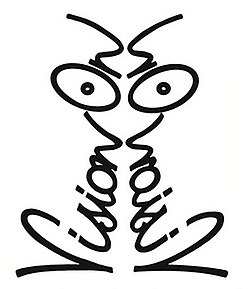Vision On
| Vision On | |
|---|---|
 |
|
| Created by | Ursula Eason and Patrick Dowling |
| Developed by | Ursula Eason and Patrick Dowling |
| Directed by | Patrick Dowling, Gerald Wiltshire, Diana Potter, Michael Grafton-Robinson, Peter Wiltshire, Clive Doig |
| Presented by | Pat Keysell and Tony Hart |
| Starring | David Cleveland, Ben Benison, Wilf Lunn, Sylvester McCoy |
| Opening theme | "Accroche-Toi, Caroline" by Caravelli |
| Ending theme | "Java" by Al Hirt and Bert Kaempfert |
| Country of origin | United Kingdom |
| Original language(s) | English and British Sign Language |
| No. of seasons | 15 |
| No. of episodes | 168 |
| Production | |
| Producer(s) | Patrick Dowling |
| Production company(s) | BBC |
| Distributor | BBC |
| Release | |
| Original network | BBC 1 |
| Original release | 6 March 1964 – 11 May 1976 |
| Chronology | |
| Preceded by | For Deaf Children |
| Followed by | Take Hart |
| Related shows | Hartbeat |
Vision On was a British children's television programme, shown on BBC1 from 1964 to 1976 and designed specifically for children with hearing impairment.
Vision On was conceived and developed by BBC producers Ursula Eason and Patrick Dowling to replace a monthly series For Deaf Children (1952–64), a programme paced slowly enough for children to read captions and subtitles. It was noted in surveys that a favourite for deaf children was Top of the Pops, due to its lively and fast-moving format and the fact that even the profoundly deaf could still enjoy the music's lower frequency notes.
There was initial disagreement as to whether lip-reading or British sign language would be more appropriate. Eventually it was decided that, since the new programme was intended as entertainment rather than education, communication would be entirely visual, the amount of text would be severely limited and, except for a few repeated statements, speech would be abandoned altogether. The title Vision On referred to the illuminated sign in studios indicating that cameras were live. Normally another sign "Sound On" would follow, but the titles for Vision On deliberately omitted this. The programme's logo is made up from the words of the title and its reflection.
The aim of the programme was to entertain but also to encourage imagination, with a fast-paced flow of contrasting ideas, both sane and silly. This mixture was an apparent success as the series ran for twelve years and, while retaining a commitment to the deaf, attracted a wider following and gained several awards including the international Prix Jeunesse and the BAFTA Award for Specialised Programmes.
A full list of contributors can be found, but the main presenters were:
Besides the scenes with Hart, Keysell and the others doing artwork (which in later years appeared on the screen as the artwork being made without any hands), Vision On had many memorable segments:
Despite its intended hearing-impaired audience, the show made extensive use of music for the benefit of hearing viewers watching the show. Notable themes included:
...
Wikipedia
